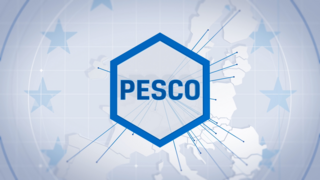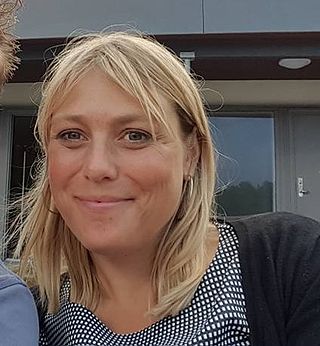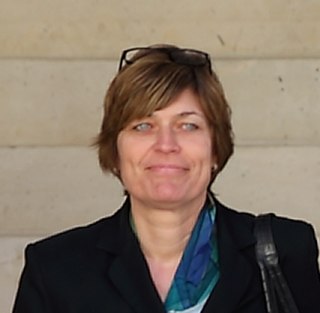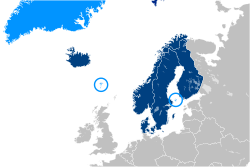The Danish Defence is the unified armed forces of the Kingdom of Denmark charged with the defence of Denmark and its self-governing territories Greenland and the Faroe Islands. The military also promote Denmark's wider interests, support international peacekeeping efforts and provide humanitarian aid.

The Swedish Armed Forces are the armed forces of the Kingdom of Sweden, tasked with the defence of the country as well as with promoting Sweden's wider interests, supporting international peacekeeping, and providing humanitarian aid. It consists of four service branches: the Swedish Army, the Swedish Air Force and the Swedish Navy, as well as a military reserve force, the Home Guard. Since 1994, all Swedish military branches are organised within a single unified government agency, the Swedish Armed Forces Headquarters, which is headed by the Supreme Commander, even though the individual services maintain their distinct identities.

The Nordic Council is the official body for formal inter-parliamentary Nordic cooperation among the Nordic countries. Formed in 1952, it has 87 representatives from Denmark, Finland, Iceland, Norway, and Sweden as well as from the autonomous areas of the Faroe Islands, Greenland, and Åland. The representatives are members of parliament in their respective countries or areas and are elected by those parliaments. The Council holds ordinary sessions each year in October/November and usually one extra session per year with a specific theme. The council's official languages are Danish, Finnish, Icelandic, Norwegian, and Swedish, though it uses only the mutually intelligible Scandinavian languages—Danish, Norwegian, and Swedish—as its working languages. These three comprise the first language of around 80% of the region's population and are learned as a second or foreign language by the remaining 20%.

Frederik X is King of Denmark. He acceded to the throne following his mother's abdication on 14 January 2024.

The Scandinavian defence union was a historical idea to establish a military alliance between Sweden, Norway, Finland and Denmark after the end of World War II, but the idea did not come about when Denmark, Iceland and Norway joined NATO in 1949 at the request of the United States, while Finland and Sweden did not.
Sweden had a policy of neutrality in armed conflicts from the early 19th century, until 2009, when it entered into various mutual defence treaties with the European Union (EU), and other Nordic countries. The policy originated largely as a result of Sweden's involvement in the Napoleonic Wars, during which over a third of the country's territory was lost in the Finnish War (1808–1809), including the traumatic loss of Finland to Russia, which it remained part of until Finland gained independence in 1917. Resentment towards the Swedish king Gustav IV Adolf, who had consistently pursued an anti-Napoleonic policy and thereby caused the war, precipitated a coup d'état known as the Coup of 1809. The new regime deposed the king and introduced the Instrument of Government (1809), later formulating a new foreign policy that became known as The Policy of 1812.
The Nordic Council Literature Prize is awarded for a work of literature written in one of the languages of the Nordic countries, that meets "high literary and artistic standards". Established in 1962, the prize is awarded every year, and is worth 350,000 Danish kroner (2008). Eligible works are typically novels, plays, collections of poetry, short stories or essays, or other works that were published for the first time during the last four years, or in the case of works written in Danish, Norwegian, or Swedish, within the last two years. The prize is one of the most prestigious awards that Nordic authors can win.
Generalmajor is the Germanic variant of major general, used in a number of Central and Northern European countries.
Oberst is a senior field officer rank in several German-speaking and Scandinavian countries, equivalent to Colonel. It is currently used by both the ground and air forces of Austria, Germany, Switzerland, Denmark, and Norway. The Swedish rank överste is a direct translation, as are the Finnish rank eversti and the Icelandic rank ofursti.

Bjørn Arild Gram is a Norwegian politician currently serving as minister of defence since 2022. A member of the Centre Party, he previously served as minister of local government from 2021 to 2022.

NATO is an international military alliance consisting of 32 member states from Europe and North America. It was established at the signing of the North Atlantic Treaty on 4 April 1949. Article 5 of the treaty states that if an armed attack occurs against one of the member states, it shall be considered an attack against all members, and other members shall assist the attacked member, with armed forces if necessary. Article 6 of the treaty limits the scope of Article 5 to the islands north of the Tropic of Cancer, the North American and European mainlands, the entirety of Turkey, and French Algeria, the last of which has been moot since July 1962. Thus, an attack on Hawaii, Puerto Rico, French Guiana, the Falkland Islands, Ceuta or Melilla, among other places, would not trigger an Article 5 response.
The Ranks and insignia of Royal Danish Army follows the NATO system of ranks and insignia, as does the rest of the Danish Defence. The ranks are based around German and French military terms.
Nordvision is a cooperative venture, established in 1959, between five Nordic public service broadcasters: Denmark's DR, Norway's NRK, Iceland's RÚV, Sweden's SVT and Finland's YLE. Sweden's SR and UR, Greenland's KNR and the Faroe Islands' KVF are associate members.

The Permanent Structured Cooperation (PESCO) is the part of the European Union's (EU) security and defence policy (CSDP) in which 26 of the 27 national armed forces pursue structural integration. Based on Article 42.6 and Protocol 10 of the Treaty on European Union, introduced by the Treaty of Lisbon in 2009, PESCO was first initiated in 2017. The initial integration within the PESCO format is a number of projects which launched in 2018.

The Arctic Policy of the Kingdom of Denmark defines the Kingdom's foreign relations and policies with other Arctic countries, and the Kingdom's strategy for the Arctic on issues occurring within the geographic boundaries of "the Arctic" or related to the Arctic or its peoples. In order to clearly understand the Danish geopolitical importance of the Arctic, it is necessary to mention Denmark's territorial claims in areas beyond its exclusive EEZ in areas around the Faroe Islands and north of Greenland covering parts of the North Pole, which is also claimed by Russia.

The Joint Expeditionary Force (JEF) is a United Kingdom-led Northern European multi-national military partnership designed for rapid response and expeditionary operations. In addition to the United Kingdom, which initiated the establishment of the force in 2012, it consists of the Nordic countries, the Baltic states, and the Netherlands.

Trine Bramsen is a Danish politician of the Social Democrats, who has been a member of the Folketing since 2011. She served as minister of transport from February to December 2022 and minister of defence from 2019 until February 2022.
Commander-captain or commanding captain is a naval rank, used in a number of navies, including all Scandinavian nations. The rank is rated OF-4 within NATO forces.

Lone Dencker Wisborg is a Danish diplomat, lawyer and civil servant. She is the current Permanent Representative of Denmark to NATO, having previously served as Ambassador of Denmark to the United States, from 2019 to 2022, the first woman to hold that position.












